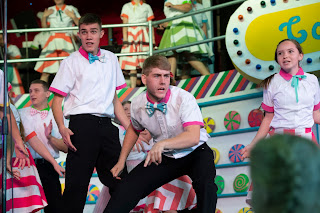Stop by the 4-H building at the Minnesota State Fair, and there’s a good chance you can catch part of a theatrical performance. Arts-In and Share the Fun performances take place throughout the state fair and showcase 4-H members participating in the performing arts project.
As adults on the outside, it's easy to observe the skills that youth gain while participating in a theatrical performance: teamwork, confidence, and public speaking or technical knowledge. What’s harder to see are the internal changes and connections that performing arts can have on youth, whether they are performing or observing.
Recent qualitative research out of Canada concludes that even watching live performances can have an impact on identity formation in teens. After watching a live play as part of a school trip “several students commented on how the artistic portrayal of a parental relationship inspired them to think more empathetically about their own families.” Youth were able to take their experience, reflect on it internally, and apply it to their life.
In the same study, a student who saw a different play and discussed it with her friends afterward commented “I kind of took in everyone’s reactions and then put my thoughts together.” That response makes a direct connection to one of the eight basic youth needs, to discuss conflicting values and form their own. The study concludes “sharing with students the experience of watching innovative productions that take on pressing issues such as economic inequality, racism and injustice can offer powerful learning opportunities.”
The benefits have the potential to be even more profound for youth who participate in theater-making. Arts-based research by Gina L. Grandi found that the context of developing a theatrical performance “creates a community in which ideas and questions can be deeply examined” and that teenage participants were “more comfortable expressing their uncensored thoughts and opinions” despite the presence of adults. These responses connect to two more of the basic youth needs, experiencing belonging and ownership and developing quality relationships with peers and adults.
Performing arts projects may have a lot of emphasis on the external view of the end product - the lights, the music, the choreography, the portrayal of the characters in front of the audience; however, theater made in a quality youth development context will have a considerable impact on the internal as well - the work leading to the performance and the youth’s inner understanding of themself.
Have you used performing arts to tackle hard topics or push youth to dig deep within themselves? Please share your experiences in the comments.
-- Sarah Odendahl, Extension educator
You are welcome to comment on this blog post. We encourage civil discourse, including spirited disagreement. We will delete comments that contain profanity, pornography or hate speech--any remarks that attack or demean people because of their sex, race, ethnic group, etc.--as well as spam.

Comments
Post a Comment